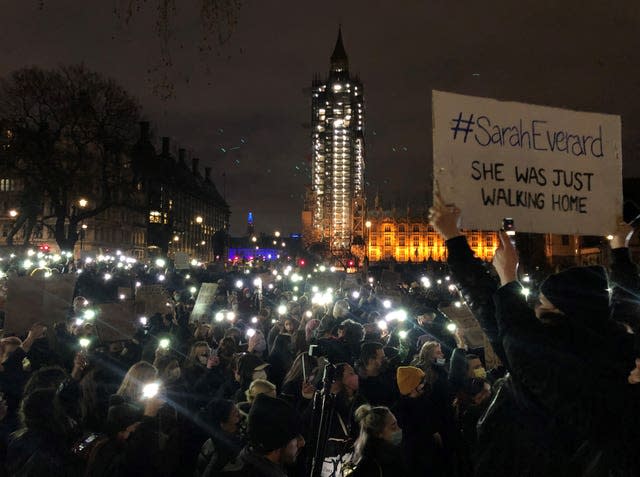Metropolitan Police: What are the key findings of the Casey review?

Baroness Louise Casey’s review, commissioned in the wake of Sarah Everard’s murder, has laid bare in more than 300 pages a series of grave concerns about the Metropolitan Police’s culture and standards.
Describing her findings as “rigorous, stark and unsparing”, she said she hopes they will lead to fundamental change in the force.
Key findings include:
– Britain’s largest police force is institutionally racist, misogynist and homophobic
The review found widespread bullying, with a fifth (22%) of staff and officers with protected characteristics experiencing bullying, and a third (33%) of those with a long-standing illness, disability or infirmity.
There is “deep-seated homophobia within the Met” – almost one in five lesbian, gay and bisexual Met employees have personally experienced homophobia and 30% of LGBTQ+ employees said they had been bullied.
Female officers and staff “routinely face sexism and misogyny”. The Met has “not protected its female employees or members of the public from police perpetrators of domestic abuse, nor those who abuse their position for sexual purposes”. Despite the Met saying violence against women and girls is a priority, it has been treated differently from “serious violence”.
There are people in the Met with racist attitudes, and black, Asian and ethnic minority officers and staff are more likely to experience racism, discrimination and bullying at their hands. “Discrimination is often ignored, and complaints are likely to be turned against Black, Asian and ethnic minority officers,” the report said.
Black officers are 81% more likely to be in the misconduct system than white colleagues, the report said.
– Predatory and unacceptable behaviour has ‘been allowed to flourish’
Concerns raised through the disciplinary process are “not well recorded”, with complaints “more likely dismissed than acted upon”.
Patterns of behaviour and escalating incidents which are hallmarks of predatory behaviour are not identified.
The report said: “Time and time again, those complaining are not believed or supported. They are treated badly, or face counter-claims from those they have accused.
“In the absence of vigilance towards those who intend to abuse the office of constable, predatory and unacceptable behaviour has been allowed to flourish.
“There are too many places for people to hide. The integrity of the organisation remains vulnerable to threat.”
– The Met has a culture of denial
There is a “strong tendency to look for a positive spin”, seeking to put problems in the past and “blame individual bad apples rather than pausing for genuine reflection on systemic issues”. The Met takes a “tick box approach” to critical findings.
While the Met’s new leadership offers a “welcome change of tone and approach”, the report said “deep-seated cultures need to be tackled in order for change to be sustained”.

The force has a “we know best attitude”, dismissing criticism, and does not “own” its failures, believing no-one outside the Met can understand the “special nature and unique demands” of its work.
“This hubris has become a serious weakness,” the report said.
The report describes the force as having a “culture of denial”, highlighting that many of the concerns raised in the report have been raised before.
Speaking up “is not welcome”, the report said.
“Keeping your head down, looking the other way, and telling people – especially senior officers – what they want to hear is the way things are done in the Met.
“The culture of not speaking up has become so ingrained that even when senior officers actively seek candid views, there is a reluctance to speak up.”
Those who speak up “learn the hard way that there are adverse consequences for themselves, for their careers, and for their teams.”
Systems “support wrongdoers” and complainants are “not believed”.
– There are ‘systemic and fundamental problems’ in how the Met is run
The force has “inadequate management”, and recruitment and vetting are “poor and fail to guard against those who seek power in order to abuse it”.
Because there is “no central record of training”, officers “may well be in roles which they are not trained for”.
The Met’s processes “do not effectively root out bad officers, help to tackle mediocre officers, or truly support and develop good officers”.
– Londoners have ‘been put last’, with women and children left behind
The capital “no longer has a functioning neighbourhood policing service” and the “de-prioritisation and de-specialisation of public protection has put women and children at greater risk than necessary”.

This has left an “overworked, inexperienced workforce” investigating child protection, rape and serious sexual offences cases.
The force’s violence against women and girls strategy “rings hollow” and those investigating domestic abuse have “unmanageable caseloads” and there is poor support for victims.
The child protection service continues to have “major inadequacies”, despite a watchdog issuing the most severely critical report in its history on the issue in 2016.
Structural changes reducing 32 borough-based commands to 12 units covering up to four boroughs has weakened links between officers and the community.
The review team “witnessed clear signs of high stress and pressure among officers”.
Sergeants and inspectors are “expected to manage very large numbers of constables and junior staff … without the time and the tools to do so”.
– There is a lack of diversity in the Met
Since the Macpherson report was published in 1999, the Met has “remained largely white and largely male”.
Baroness Casey’s report added: “If recruitment continues on its current trajectory, it will take at least another 30 years, until 2053, to reach gender balance.
“It will take even longer, until 2061, to reach 46% Black, Asian and ethnic minority representation – what is needed to be representative of London today, let alone the even more diverse city it will be in nearly 40 years’ time.”
The police uplift programme – the Government’s recruitment campaign to hire 20,000 new officers in forces across England and Wales – has been a “missed opportunity to improve the diversity and skills base of its workforce”.

 Yahoo News
Yahoo News 
